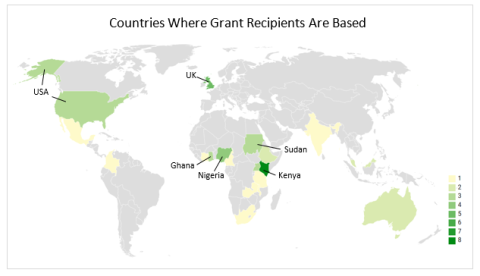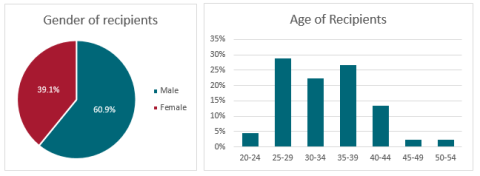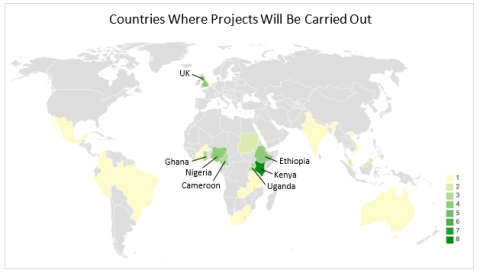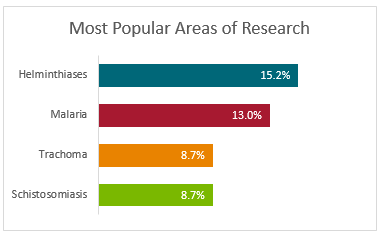A record-breaking year for RSTMH small grants

We have now awarded all the small grants for the 2019 small grants programme. This has been a record-breaking year, as we were able to award 50 early career research grants to researchers based across the world.
A record-breaking year
In 2018, and for the years before that, we were only able to award 16 grants, given the funds we had available.
The enormous growth this year from 16 to 50 has been made possible through partnerships with the National Institute for Health Research (NIHR), the research function of the Department of Health and Social Care (DHSC) and the International Trachoma Initiative (ITI) who have provided funds to add to our existing budget. We would like to thank our partners who have made these awards possible.
RSTMH small grants often represent the first opportunity for this group of researchers to manage their own budget, recruit people, buy supplies and lead research, and showcase the results through presentations or publication.
A chance for ideas to be tested out
They are a great chance for early ideas to be tested out, and we hope the results of this research would enable some of our cohort to then take their ideas to the next stage with higher levels of funding.
We will keep in touch with this cohort and hear from them as they roll out their research and deliver their reports. As I write this, we are eagerly awaiting the results of the 2018 small grants research, and to see what a difference the grants have made to their careers.
Providing awards to three times more people than in past years is a great achievement for RSTMH and our partners, however we are still a long way from us being able to award every application for research that is seen as high quality. This year, we had a total of 186 grants that were seen as being at a standard high enough to be funded.
Thank you to our Global Assessors
The job of assessing applications is in the hands of our global network of Global Assessors whose role it is to review the applications and provide the detailed assessments. Each application is reviewed by at least two Assessors.
This year, as all years, we would not have been able to deliver our small grants programme without their support and I would like to thank them for all of their time and dedication in collectively carrying out over 1,000 assessments.
I wanted to share with you some more detailed analysis of the awardees, including the gender parity and age range, thematic areas, countries where research will be carried out and where our researchers are based.
Gender
There was a gender split of approximately 60:40 male and female recipients. The gender split between male and female was closer to evenly split at the point of submission of applications this year, so this is something we will have a closer look at.

Age
The age of recipients ranged from 24 to 50 years old. The median and average age were both 33 years. The majority of applicants were between the ages of 25 and 39.

Countries where recipients are normally based
Recipients represented six continents and 20 countries. 67.4% of recipients were based in the African continent.
The country with the highest number of recipients was Kenya, with eight individuals (17.4%) receiving small grants. This was followed by the United Kingdom, where five individuals (10.9%) received small grants. The UK was also the only European country to receive small grants.

Areas of research
Helminthiasis was a particularly popular research area, making up 15.2% of projects awarded funding. Within this field, projects covered soil-transmitted helminthiasis as well as lymphatic filariasis and river blindness (onchocerciasis).
Malaria was another major area of research, accounting for 13.0% of projects awarded funding.
This was followed by trachoma and schistosomiasis, which made up 8.7% each of projects awarded funding.
There are some NTDs such as snakebite, mycetoma and other skin diseases, and leprosy where we expected to see higher levels of submission, and this is something we will be looking at closer as well.
Similarly, studies about the externalities affecting human health such as multi-morbidities, disability, mental health, conflict context and climate change were not as present as we expected.
We are already into our planning for the next round of our small grants, which we will open in early 2020. We hope that early career researchers and other professionals from all countries, and all disciplines will take part next year, as a chance to look into early ideas, which can be from lab to policy research across all areas of tropical medicine and global health.
Please watch this space for more news on the 2020 programme over the coming weeks. We hope you apply, or let your networks of early careers contacts know about the small grants so they can take part.

